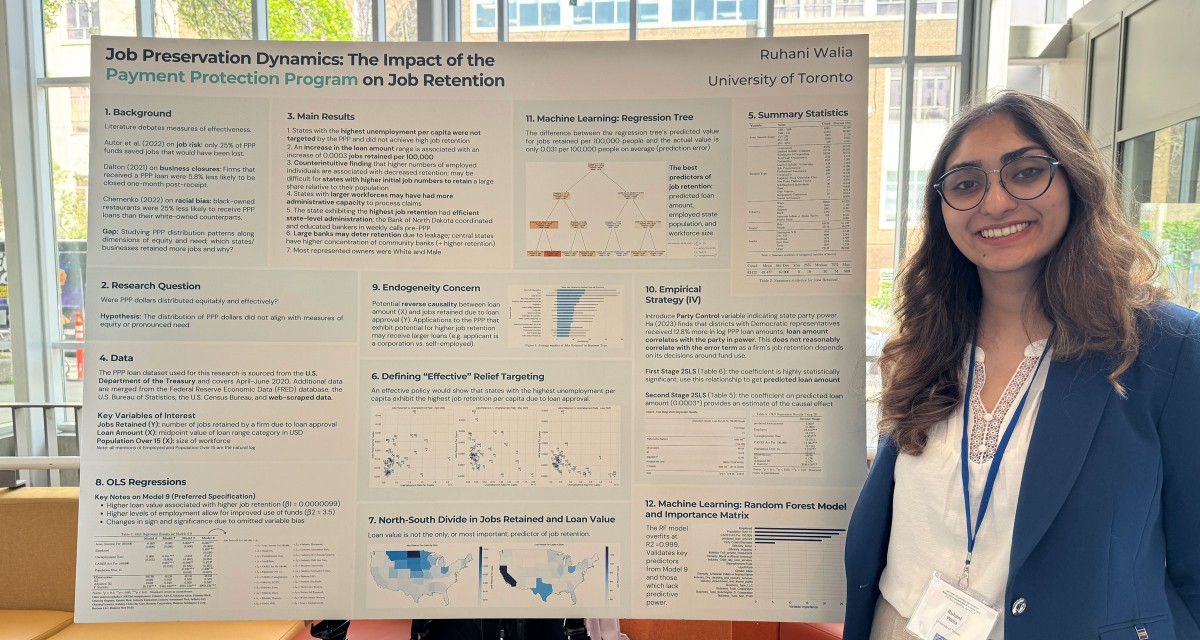Vic Student Ruhani Walia Shines at CEA’s Annual Meeting

The Bank of Canada and the Canadian Economics Association (CEA) are two of the strongest forces shaping economic policy in Canada. Economics major Ruhani Walia has already met representatives from both organizations. As a finalist in the Bank of Canada’s Undergraduate Student Paper Awards, the Victoria College student presented her research findings at the annual meeting of the CEA.
Ruhani submitted her paper Job Preservation Dynamics: A Comprehensive Study of Payment Protection Program Loan Efficacy, when she saw the call for submissions this spring.
“I was working on some research for my course, which was ECO 225, and it was supposed to be 30 to 40 pages,” Ruhani remembered, “I just had so much fun with the code and the different data methods that we learned in the class, that mine ended up being about 100 pages. So, I submitted the final project version of the paper to the contest. Then, after a couple of weeks, they told me that I was invited to present, which was super exciting.”
Ruhani’s paper concerns an American federal government program called the CARES Act, or the Coronavirus Aid Recovery and Economic Security Act.
“The act was worth approximately 2.2 trillion towards financial aid and the portion of that money that was going towards small businesses, which was taken upon by the Small Business Association or the SBA was called the Payment Protection Program,” Ruhani explained. “I wanted to study the effectiveness and the equity of the distribution of the dollars throughout that program.”
“My main findings throughout the paper really underscore the importance of federal and state-level administrative infrastructure., and one of the data points that I found through my research was noting which states have received higher loan amounts per capita from the program compared to the number of jobs that a business was able to retain because of the approval of a loan,” she explained. “I noticed that states that had received some of the lowest loan amounts per capita were maintaining the highest jobs retained per capita, which indicated other factors at play, which is really strange.”
The contest short-list of ten students from different universities across the country attended the conference and presented the results of their undergraduate research projects.
“I got to meet them all and that was really wonderful,” Ruhani remembered. “We all had huge posters we designed based on our papers to create a summary of the research. Those were the versions attendees saw and I got to speak to so many economists about my work.”
The CEA Annual Meeting was not the first time Ruhani had presented her results. A few weeks earlier she joined several colleagues at the online 4th Annual Tech Econference organized by Professor Nazanin Khazra. The experience helped her prepare to present at the CEA Conference and its mixed audience of both academic and industry economists.
“The academic economists tended to ask more questions about methodology and people who worked at the Bank of Canada, for example, asked more questions about my results,” Ruhani said, “but overall, the emphasis was on policy implications because of my topic. It was just so great to meet everyone and get a sense of the intellectual rigour we have in the field.”
When other undergraduates come across opportunities like the Bank of Canada Awards, Ruhani urges them to put the time into their submission and to enter!
“My thought process when I entered was thinking it would be awesome if I could get more feedback on my work,” she explained. “And I learned that people were willing to stop and give me feedback on the details they saw on my poster. You don’t lose anything by applying, you might be a little disappointed if you don’t get in, but you’ll still have the work you submitted, and you’ll still be learning.”
Ruhani experienced the benefits of networking in a professional capacity within two weeks of the conference.
“I received an internship offer from the Bank of Canada!” Ruhani said. “The opportunity to work in the Ottawa Headquarters wouldn’t have been possible had I not had the opportunity to network at the conference and share my work.
(This article is courtesy of the Department of Economics, University of Toronto.)
